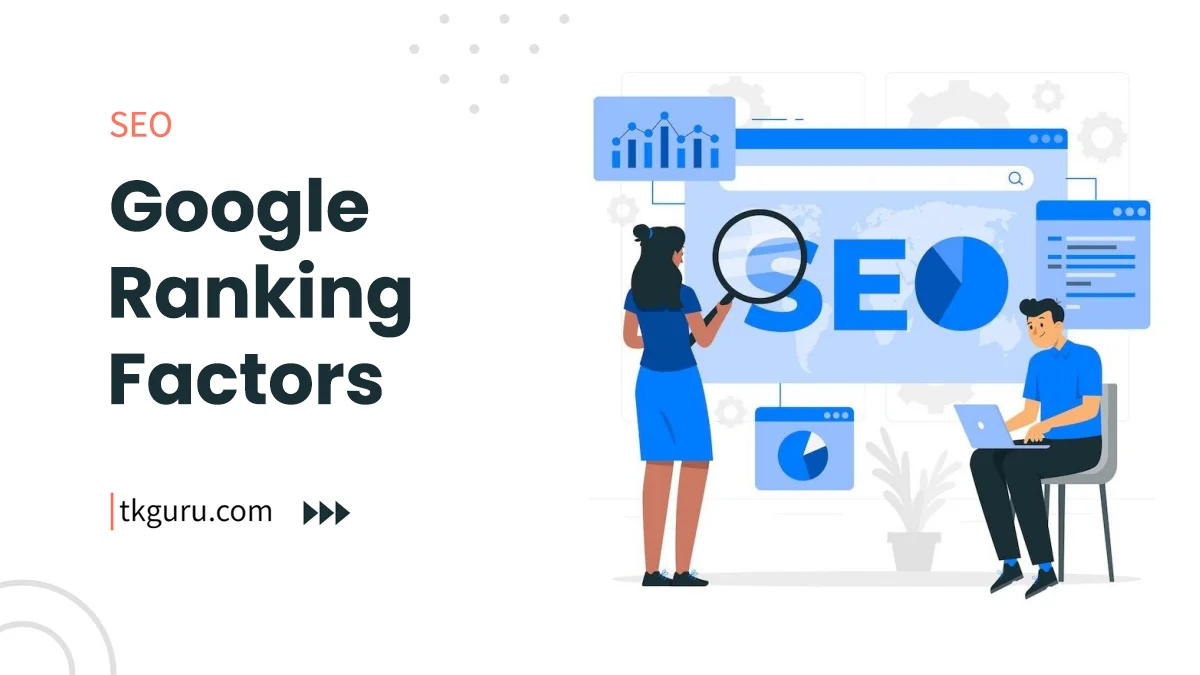Advertisements
Ratings

Google Ranking Factors – In the ever-expanding digital landscape, achieving a prominent spot in search engine results is paramount for online success. Google, being the dominant search engine, utilizes a complex algorithm to determine the ranking of websites.
In this article, we will delve into the intricacies of Google ranking factors, dissecting on-page and off-page elements, technical considerations, user experience signals, and the evolving landscape of algorithm updates.
By understanding these factors, you can optimize your website to climb the search engine ladder and achieve better online visibility.
Contents
- 1. The Google Algorithm: Decoding the Digital Enigma
- 2. On-Page Ranking Factors: Crafting Content that Captivates
- 3. Technical SEO and Site Architecture: Laying a Strong Foundation
- 4. Off-Page Ranking Factors: Building Authority from Beyond
- 5. User Experience and Engagement Signals: Captivating Your Audience
- 6. Content Factors and Rich Snippets: Standing Out in the SERPs
- 7. Core Web Vitals and User Page Experience: Google’s Focus on Performance
- 8. Navigating Algorithm Updates and Changes: The SEO Evolution
- Conclusion: The Art and Science of SEO Mastery
- Google Ranking Factors FAQs
1. The Google Algorithm: Decoding the Digital Enigma
Google’s algorithm is an intricate system of rules that determines how websites are ranked in search results. With a commitment to delivering relevant and high-quality content, Google constantly refines its algorithm to match user intent effectively.
2. On-Page Ranking Factors: Crafting Content that Captivates
Content Quality and Relevance
One of the foundational elements of on-page SEO is high-quality content. Google rewards websites that provide valuable, original, and informative content that resonates with users. Ensuring your content aligns with search intent is key to establishing relevance.
Keywords and Semantic SEO
Keywords serve as the bridge between user queries and content. Incorporating target keywords naturally into your content helps signal relevance to search engines.
Additionally, semantic SEO, which focuses on the context and relationships between words, further refines search results and enhances user experience.
| On-Page Factor | Explanation |
|---|---|
| Content Quality | Create informative, original, and valuable content that answers user queries. |
| Keywords and Semantics | Research and incorporate relevant keywords naturally, while also considering semantic context. |
3. Technical SEO and Site Architecture: Laying a Strong Foundation
Page Loading Speed
Page speed plays a critical role in user satisfaction and SEO. Slow-loading pages can deter visitors and negatively impact rankings.
Optimizing images, leveraging browser caching, and minimizing server response times are vital for faster load times.
Mobile-Friendliness
Google’s mobile-first indexing prioritizes mobile versions of websites for ranking. Ensure your website is responsive and provides an optimal experience on mobile devices to avoid losing out on rankings and traffic.
Secure HTTPS Protocol
Website security is a significant ranking factor. Migrating from HTTP to HTTPS not only ensures data security but also provides a ranking boost. Google Chrome now even marks HTTP sites as “Not Secure,” potentially discouraging visitors.
| Technical Factor | Explanation |
|---|---|
| Page Loading Speed | Optimize elements like images and code to ensure fast loading times. |
| Mobile-Friendliness | Ensure your website is mobile-responsive for optimal viewing on all devices. |
| Secure HTTPS | Transition to HTTPS for improved security and a potential ranking advantage. |
4. Off-Page Ranking Factors: Building Authority from Beyond
Backlinks and Link Quality
Backlinks are akin to digital votes of confidence. High-quality backlinks from authoritative sources indicate the credibility and relevance of your content.
However, focus on acquiring organic and relevant backlinks, as low-quality or spammy links can harm your rankings.
Social Signals
While not a direct ranking factor, social signals can indirectly influence rankings. Engaging content that gets shared on social media may attract attention and organic backlinks, which, in turn, can positively impact SEO.
| Off-Page Factor | Explanation |
|---|---|
| Backlinks | Acquire high-quality, authoritative backlinks to enhance your website’s authority. |
| Social Signals | Engaging content shared on social media can indirectly influence SEO. |
5. User Experience and Engagement Signals: Captivating Your Audience
Click-Through Rate (CTR)
A higher CTR indicates that your meta titles and descriptions are compelling and relevant to users. Crafting enticing snippets can entice users to click through to your content.
Bounce Rate and Dwell Time
A low bounce rate and longer dwell time indicate that visitors find your content valuable and engaging.
High-quality content, clear navigation, and interactive elements contribute to longer onsite engagement.
| Engagement Signal | Explanation |
|---|---|
| Click-Through Rate | Craft compelling meta titles and descriptions to increase click-through rates. |
| Bounce Rate | Offer valuable content and a user-friendly experience to reduce bounce rates. |
| Dwell Time | Engaging content and user experience can lead to longer dwell times. |
6. Content Factors and Rich Snippets: Standing Out in the SERPs
Featured Snippets and Structured Data
Featured snippets are concise answers displayed at the top of search results, capturing users’ attention.
Implementing structured data (Schema markup) helps search engines understand and present your content more effectively.
Video and Visual Content
The rise of video and visual content has changed search results. Optimizing multimedia content can improve user engagement and increase the likelihood of appearing in video and image search results.
| Content Factor | Explanation |
|---|---|
| Featured Snippets | Implement structured data to increase the chances of being featured in search snippets. |
| Video and Visuals | Optimize video and visual content for better visibility in search and user engagement. |
7. Core Web Vitals and User Page Experience: Google’s Focus on Performance
Google’s Core Web Vitals focus on user-centric performance metrics that contribute to a better browsing experience.
| Core Web Vitals | Explanation |
|---|---|
| Largest Contentful Paint | Measures loading performance and when the main content becomes visible to users. |
| First Input Delay | Measures the time delay between a user’s first interaction and the browser’s response. |
| Cumulative Layout Shift | Measures visual stability by assessing unexpected layout shifts during page loading. |
Google Algorithm Updates
Google frequently updates its algorithm to enhance search results. Major updates like Panda, Penguin, Hummingbird, and BERT have significantly impacted how websites rank. Staying informed about these updates is crucial.
Adapting to Changes
To stay ahead in the SEO game, adaptability is key. By continuously monitoring changes and trends, you can adjust your strategies and techniques to align with Google’s evolving algorithm.
Conclusion: The Art and Science of SEO Mastery
In the intricate realm of Google ranking factors, understanding the multifaceted elements that influence search results is vital for online success.
By crafting high-quality, relevant content, optimizing technical aspects, fostering engagement, and staying attuned to algorithm changes, you can navigate the SEO landscape with confidence.
Remember that SEO is a blend of both art and science – it requires creativity, strategy, adaptability, and a commitment to delivering value to your audience.
As you master the nuances of Google’s ranking factors, you empower your website to achieve higher visibility, greater authority, and lasting success in the digital realm.
Google Ranking Factors FAQs
What are Google ranking factors?
Google ranking factors are the criteria and signals that Google's search algorithm uses to determine the order in which web pages are displayed in search results.
These factors influence how well a page ranks for a specific query.
How many ranking factors does Google consider?
Google's search algorithm considers hundreds of ranking factors, both known and speculative.
Some are more impactful than others, and Google's algorithm is complex and constantly evolving.
What are some important on-page ranking factors?
On-page ranking factors include:
- Relevant and high-quality content.
- Proper use of keywords in titles, headings, and content.
- Mobile-friendliness and responsive design.
- Page loading speed.
- User experience and engagement metrics.
What are off-page ranking factors?
Off-page ranking factors include:
- Backlinks from authoritative and relevant websites.
- Social signals and mentions on social media.
- Online reputation and brand mentions.
- User-generated content and reviews.
How can I improve my website's ranking in Google search results?
Improving your website's ranking involves a combination of strategies:
- Create high-quality and relevant content.
- Optimize on-page elements like titles, headings, and meta descriptions.
- Focus on mobile-friendliness and fast page loading.
- Build a strong backlink profile from reputable websites.
- Enhance user experience and engagement.
Remember that Google's algorithm considers a variety of factors, and it's essential to have a holistic approach to SEO that encompasses both on-page and off-page optimization.
Stay informed about industry trends and algorithm updates to continuously refine your strategies and maintain or improve your search rankings.
| Web Hosting | Website |
| WordPress | Google Adsense |
| SEO | Affiliate Marketing |
| Blogging | YouTube |
Recent Posts
- Top 6 SEO Companies in Ahmedabad 2024: Unlock Success with the Top SEO Companies in Ahmedabad
- Top 5 SEO Companies in Kanpur 2024: Discover the Top-Rated SEO Companies in Kanpur
- Quality vs Quantity: The Importance of High-Quality Backlinks
- E-A-T and SEO: Expertise, Authoritativeness, Trustworthiness
Related Tags
most important google ranking factors, google uses how many features to determine page ranking, google ranking factors 2023, google uses …. features to determine page ranking. 200 15 1000, what are ranking factors, ranking factors in seo, seo ranking factors 2023, top 3 ranking factors google






